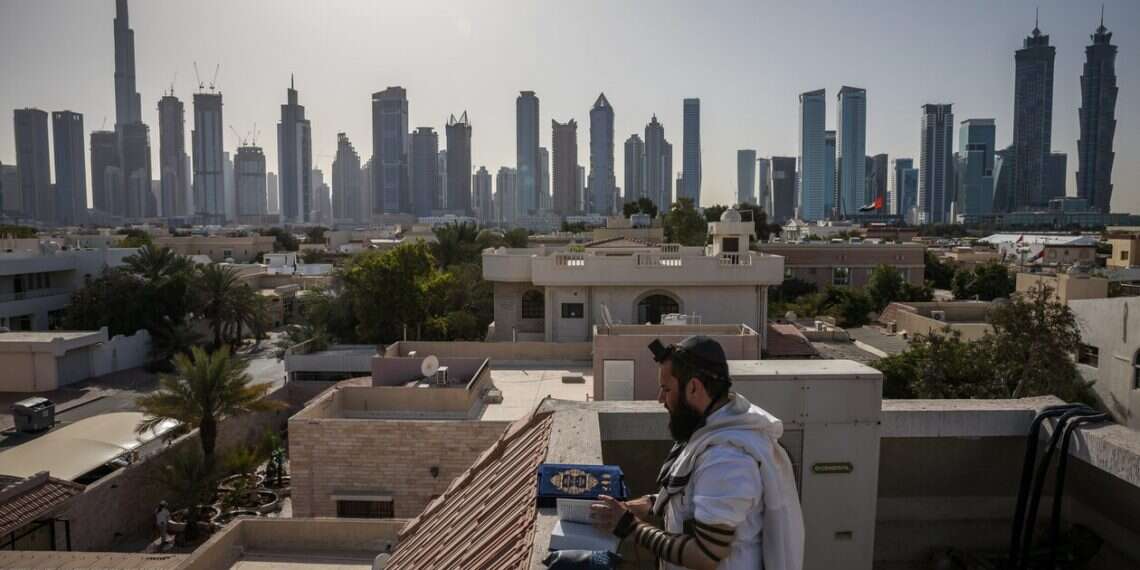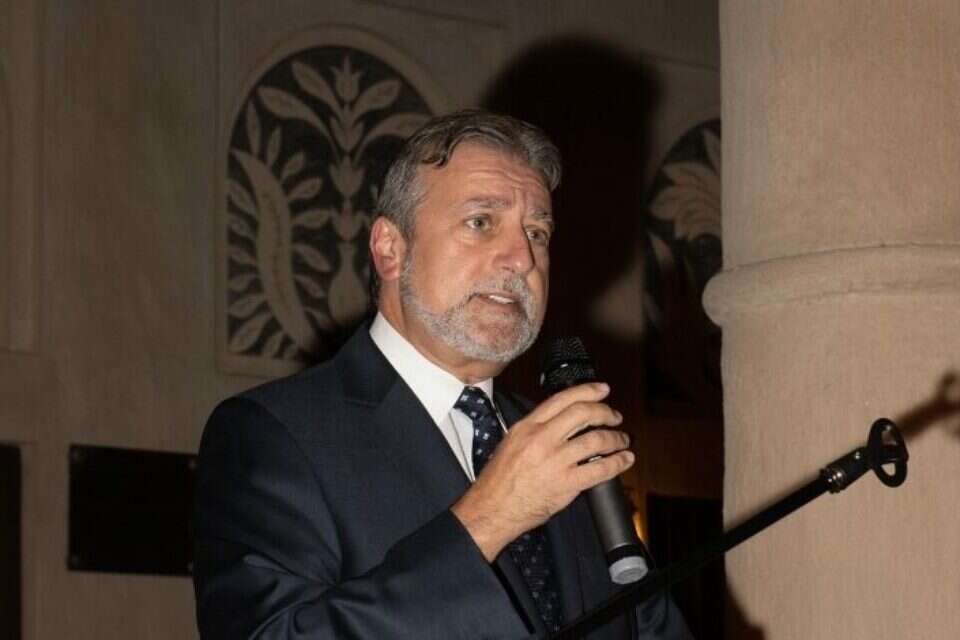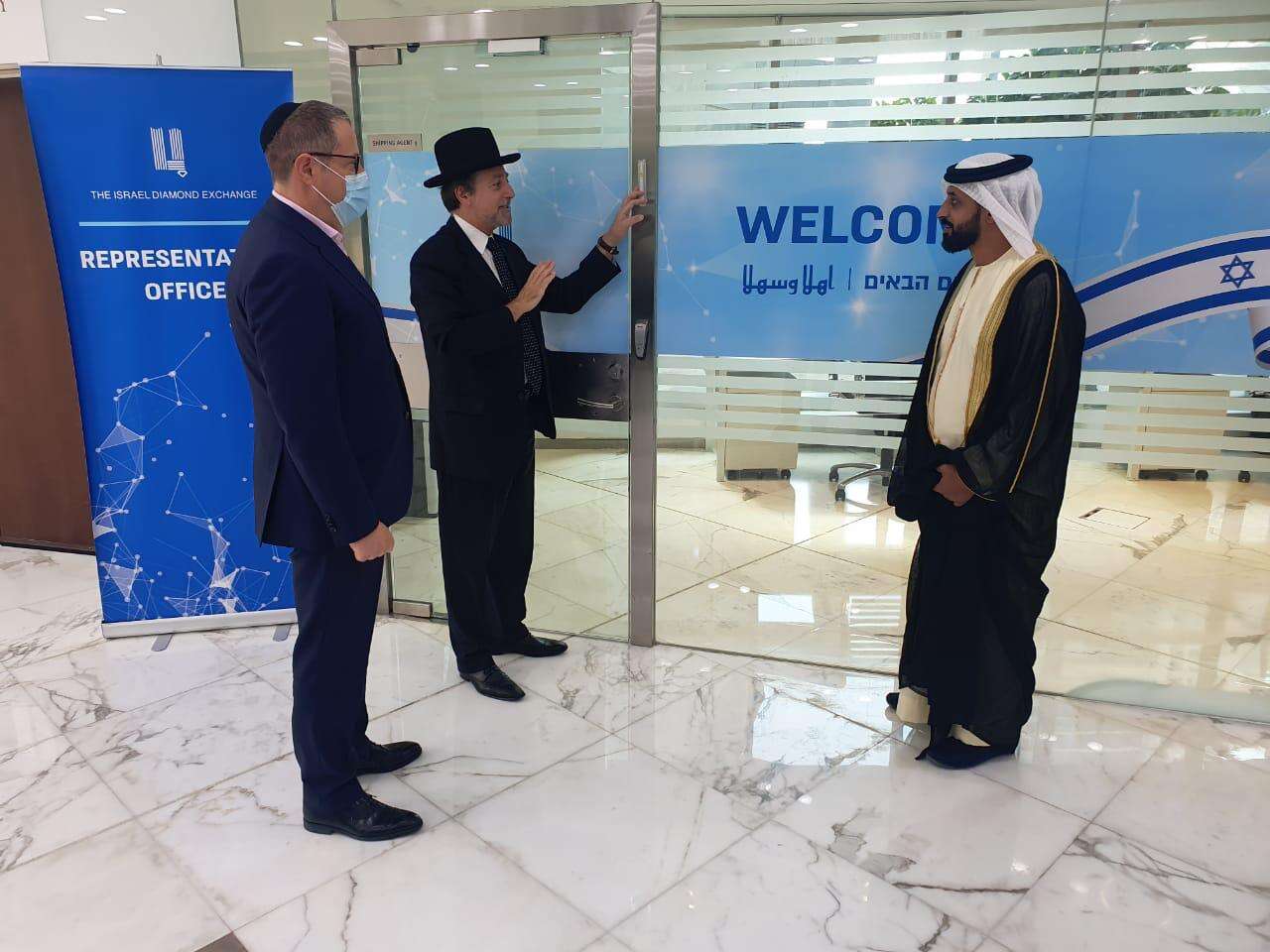by Dan Lavie
"The Emiratis say to me: 'We are sister religions, and it's a shame that more than 70 years passed before the possibility opened for us to create this connection,'" says Rabbi Dr. Elie Abadie of the Jewish community in the UAE.
 |
| Rabbi Levi Duchman performs morning prayers on the roof of the Jewish Community Center in Dubai, March 22, 2021 | File photo: Getty Images/Andrea DiCenzo |
How do you build community? From knowing its fundamentals, with consistency, and with a lot of faith. These seem to be the ingredients that precisely define the personality of Rabbi Dr. Eli Avidai, who has been appointed as the Senior Rabbi of the Jewish community in the Emirates, with the goal of developing and broadening it. "There are already plans for the whole required infrastructure – school, mikveh, community center and synagogue; everything is in process."
Aside from his wide education – the rabbi speaks six languages and is an expert on Sephardi Jewry, history, philosophy and comparative law – Abadie founded the Manhattan East synagogue and serves as its rabbi. In addition to this, he founded in New York a synagogue named after the Jewish banker Edmond Safra, as well as a community center named after Moise Safra, Edmond's brother.
On a complementary level, his genealogical background is also perfect for the job: Avidai was born in Lebanon (his parents are from Syria), and is descended from a rabbinical lineage dating back to 15th century Spain. "I left Lebanon when I was 10," he says. "Then it had the scent of an extremely Western culture, an open and geopolitical place."

Abadie had a similar feeling during his visit to Dubai two and a half years ago, which became more dramatic than he thought at the beginning. "I noticed that everyone spoke English and the style was European-American, alongside signs in Arabic of course. I started to develop relationships with the Emiratis. Masks fell and doors were opened. When I quote for them proverbs in Arabic, which I grew up on, it's something that brings us together in a way that's impossible to describe. The connection is immediate and we speak straightforwardly."
Thanks to his deep knowledge of the Koran, Muslim religion, and culture, Abadie has been present for decades at interfaith conferences attended by Jews, Muslims, and Christians. Because of this, many Emiratis are interested in learning Hebrew and Judaism in order to learn from up close the similarity between the two religions. They say to me: 'We are sister religions, and it's a shame that more than 70 years passed before the possibility opened for us to create this connection.'"
The road to community leadership
Abadie's personal connection to the Emirates began 11 years ago, when he met an American friend who does business in the Gulf during a trip to Spain. In 2019 he asked for Abadie's help in order to deliver to the Emirates a Sefer Torah in honor of Sheikh Zayed bin Sultan Al Nahyan – the first president of the UAE (and the father of Khalifa bin Zayed, the current president and the emir of Abu Dhabi).
"I traveled to visit the Jewish community that lived there almost in secret," Abadie recalls, "and six months later I was invited to the palace of Crown Prince Mohamed bin Zayed, who was extremely enthusiastic about the writing of the Sefer Torah, and so we strengthened the relationship even more."
The Muslim text the Pact of Umar, which is attributed to Caliph Omar II, determines the relationship between Muslims and non-Muslims, and even though the latter didn't enjoy the same rights – they were entitled to different benefits, including religious freedom and the security of their communities. Therefore, with the signing of the Abraham Accords, when they looked for a spiritual-religious leader for the community, as is the custom in Arab countries, Abadie's name came up, and he continued to blaze paths in the interfaith arena.
Abadie: "Even before the agreements, they began on the plan for the 'Beit Avraham' complex [which presents the common denominator between the three monotheistic faiths, and which contains a synagogue, church and mosque], and I advised them how the compound's seats need to be seen as part of the large campus that includes a church, a mosque and a synagogue, so that every religion will recognize the other and there will be internalization that we all come from the same root, from our Father Abraham.
"We need to help one another, to love and to respect one another, and to see what is the thing that connects between the three of us. It's forbidden to fight but we need to connect one to the other – that's the philosophy of Sheikh Zayed, founder of the state, and his sons are continuing this philosophy," the rabbi explains.
'We hear Hebrew in the streets'
To illustrate the change, which is felt on a daily basis, Abadie offers the following example: "Since last year, there is a law in the Emirates according to which hotels have to supply kosher food to their customers within one day of the request. There is no parallel to this in any country, even Israel!" he emphasizes.

Similarly, locals who deal in tourism are doing a special course that guides them on how to receive Jews and Israelis. "I supported them in preparing the professional syllabus, and their approach towards it gladdens the soul. They are dealing with this with the appropriate seriousness."
Abadie is quite optimistic with regard to the future of the community, especially when he compares the new peace agreements with those between Israel and Egypt and Jordan. "In my humble opinion, the earlier peace agreements were between states but not between their peoples. Here we have been living the peace with the Emirates and Bahrain for a year, and every day I see the interface between businesspeople on both sides, we hear Hebrew on the streets, we see kippot and it's seen as natural – and from here the feeling is comfortable.
"I expect that the acquaintance between the peoples will grow and deepen over the coming years, and that the Jewish community will significantly increase. From the roughly 250 families who are here now, I estimate that in another five years there will be between 3,000 and 5,000 members of the community. Over the last year at least 20 more families came to live in the Emirates. I anticipate that other Arab countries will open the doors and will make peace with Israel. It's not a question of 'if,' it's a question of 'when,'" Abadie predicts.
Dan Lavie
Source: https://www.israelhayom.com/2021/10/06/peace-with-more-arab-nations-not-a-question-of-if-but-when/
No comments:
Post a Comment